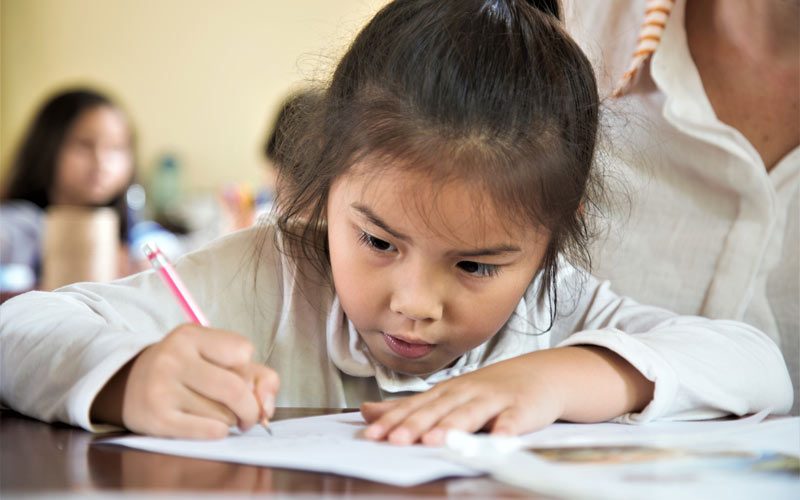
This cycle of three years provides the necessary time and coherence necessary for progressive and demanding learning. Learning is about discovering the world. An important focus is on the mastery of the French language and mathematics.
To communicate and live in society, students are reinforcing their skills in the use of spoken and written French, learning how to hear and understand spoken texts. The acquisition of vocabulary, phonological awareness and the discovery of the alphabetic principle, the attention given to the regularity of the language and a first training in the essential gestures of writing give them benchmarks to pursue learning in French.
Increased fluency in oral comprehension and expression, reading, writing; understanding language construction (grammar, spelling, lexicon).
Find all the details of the program here.
Problem solving is at the center of students’ mathematical activity. It enables them to develop their abilities to seek, to reason and to communicate. The problems make them acquire new notions and provoke questioning.
Researching, modeling, reasoning, calculating, communicating. The students learn and practice numbers and calculations, magnitudes and measures, space and geometry.
Find all the details of the program here.
Physical education and sport develops cultural and social involvement that are important in the development of personal and collective life of the individual. It raises children’s awareness of well-being and to care about their health, and introduces them to the pleasure of doing sports.
Develop motor skills and body expression, practice a sport, learn how to share roles and responsibilities, measure progress. The students will become aware on how to maintain health through regular physical activity.
Find all the details of the program here.
Cycle 2 is the starting point for foreign language learning for all students (with a corresponding level A1 education in the Oral Common European Framework of Reference for Languages).
Oral language is the priority. It is organized around simple comprehension and expressive tasks, as well as an introduction to the written foreign language.
Oral understanding and speaking, participating in a conversation; discovering a cultural aspect related to the foreign language.
Find all the details of the program here.
In Cycle 2, students will learn to “question the world” through a scientific and thoughtful approach. The general objectives of “Questioning the World” are to enable students to acquire the necessary knowledge to describe and understand the world around them, to develop their reasoning skills, and to contribute to their roles as citizens.
Practice scientific method, develop the imagination, mobilize digital tools, Adopt ethical and responsible behavior, develop capacities to think in space and time. The class will investigate the world of life, matter and objects, to investigate space and time, and to explore the organization of the world.
Find all the details of the program here.
The objective is the acquisition of a culture of morality, civic responsibility, and critical thinking to increase the student’s capacity to be aware of his/her responsibilities in his/her personal and social life. Moral and civic education also aims at a free and enlightened appropriation by students of the values that underpin a democratic and republican system of government. They will also be exposed to the rule of law and the meaning of rules of a society, including emphasizing the spirit of autonomy, cooperation and responsibility towards others.
Find all the details of the program here.
The teaching of the visual arts aims to develop the students’ potential for creativity, from the elements of artistic language such as form, space, light, color, matter, gesture, … The student explores various fields: drawing, painting, collage, modeling, sculpture, photography, video, digital creation… The student will experiment, produce, create, and implement an artistic project.
Find all the details of the program here.
Music education develops two major areas of competence in the overall musical education of the student: perception and production. Voice plays a central role in the musical practices of the class. Students will practice singing, listening and comparing sounds, both individually and in groups.
Find all the details of the program here.
Sources: CNED and Ministère de l’éducation nationale française websites.